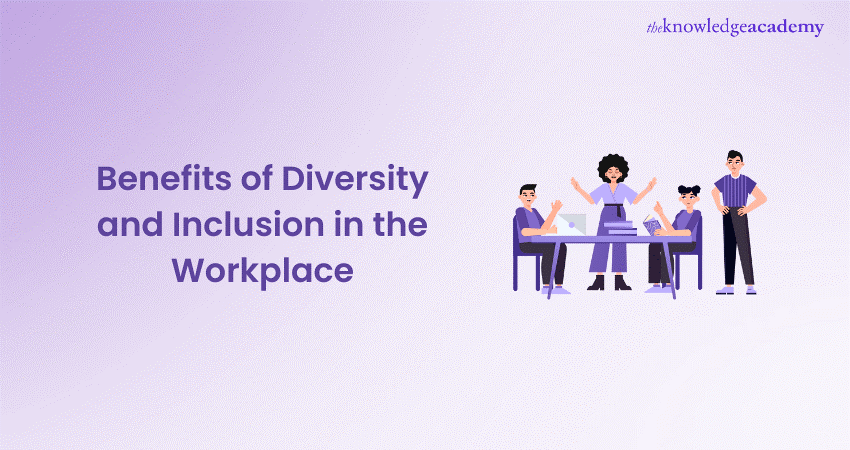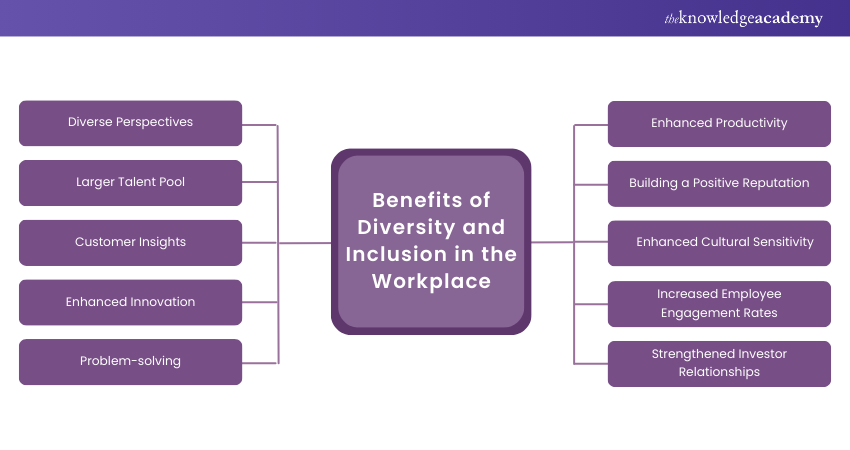We may not have the course you’re looking for. If you enquire or give us a call on +45 89870423 and speak to our training experts, we may still be able to help with your training requirements.
Training Outcomes Within Your Budget!
We ensure quality, budget-alignment, and timely delivery by our expert instructors.

Imagine a workplace where unique perspectives spark innovation, attract top talent, and solidify a competitive edge. Diversity and inclusion are not just buzzwords—they are game-changers in the modern corporate climate. Research reveals that diverse teams make decisions 87% better, while inclusive cultures are 1.8 times more prepared for change.
This blog explores the transformative Benefits Of Diversity And Inclusion In A Workplace, unpacks the various types of diversity, and offers actionable strategies to build an empowered, inclusive culture that propels organisational success.
Table of Contents
1) What is Diversity and Inclusion?
2) Types of Diversity
3) Benefits of Diversity and Inclusion in the Workplace
4) Strategies to Promote Diversity in the Workplace
5) Conclusion
What is Diversity and Inclusion?
Diversity and Inclusion (D&I) are the two of the most critical elements in modern workplaces. They aim to ensure that individuals from all backgrounds are not only present but also equally engaged and valued.
Diversity refers to the presence of cultural differences within a given setting, including characteristics such as race, gender, age, ethnicity, religion, sexual orientation, disability, etc. By promoting inclusion, we can ensure that individuals from diverse backgrounds are equally acknowledged, valued, and provided equitable opportunities.
Types of Diversity
By understanding the different types of Diversity, organisations and enterprises can develop comprehensive Inclusion strategies to boost their overall growth. Here are the main types of diversity:

1) Internal Diversity: This refers to the inherent characteristics such as race, gender, age, ethnicity, sexual orientation, and cultural abilities. These attributes significantly influence how individuals are perceived and formally treated in the workplace.
2) External Diversity: This includes attributes shaped by life experiences, such as education, marital status, religion, and socio-economic background. Moreover, it influences interactions and perspectives among the employees.
3) Organisational Diversity: Organisation diversity refers to variations in job roles, seniority, tenure, and employment status. This is beneficial as it allows for a more comprehensive range of skills and experience to be brought to the organisation.
4) Worldview Diversity: It includes diverse perspectives which are shaped by cultural backgrounds, religious beliefs, political views, and moral values. These differences make it challenging to reach a consensus or agreement. However, by respecting each other's opinions, it is possible to build bridges of understanding and create an inclusive environment.
Pump up your leadership with our Team And Management Ethics Training – Sign up today!
Benefits of Diversity and Inclusion in the Workplace
Implementing robust Diversity and Inclusion practices together has an abundance of benefits for the workplace. These benefits cultivate employee satisfaction and support the organisation's general performance and competitiveness.

1) Diverse Perspectives
A diverse team has the ability to provide multiple opinions and thoughts, which forms the ladder for the organisation’s efficient problem-solving, creativity, and innovation. When employees from diverse backgrounds try to collaborate, they contribute their unique and perceived insights, resulting in more effective and innovative solutions.
2) Larger Talent Pool
Diversity and Inclusion provide an inclusive expansion to the talent pool. This approach enables organisations to recruit and retain the most deserving candidates from different backgrounds Moreover, by eliminating barriers and biases in the recruitment process, companies can leverage the high-profile benefits of a more diverse group of employees.
3) Customer Insight
A diverse team can respond better to the different demands of a multiple levels of clients. Employees who represent the demographics of the market can provide valuable insights into customer preferences. This further leads to more tailored and effective marketing strategies.
4) Enhanced Innovation
Diverse candidates work in a culture-driven environment where multiple ideas and perspectives are encouraged and valued. Moreover, diverse teams are more likely to think creatively, which leads to significant advancements in products, services, and processes.
5) Problem-solving
Diverse teams often bring different perspectives that can enhance problem-solving effectiveness. This large variety of perspectives allows for a more comprehensive analysis of issues, leading to empowered decision-making. This diversity of thoughts also helps avoid collaborative thinking and promotes more robust and well-rounded solutions.
6) Enhanced Productivity
An inclusive workplace results in better collaboration while promoting open idea-sharing among employees. This approach can lead to higher efficiency and productivity. As when employees from diverse backgrounds work together in harmony. The organisation benefits from a more dynamic and effective workforce.
7) Building a Positive Reputation
A diversity and inclusion commitment can boost the reputation of the organisation internally and externally among employees, clients, and customers. Furthermore, internally, employees are proud to work for an inclusive company which welcomes loyalty and reduces turnover. In contrast, externally, clients and customers are more likely to engage with companies that reflect and replicate their values.
8) Enhanced Cultural Sensitivity
Diverse workplaces can promote a sense of cultural sensitivity among employees, leading to better understanding and respect for diverse cultures and practices. This sensitivity is crucial in modern globalised businesses, where organisations can operate across borders and interact with a diverse range of stakeholders.
9) Increased Employee Engagement Rates
An inclusive workplace empowers a sense of belonging among employees, which can significantly boost their engagement levels. When employees feel valued, respected, and included, they are more likely to stay motivated for long and committed to their work. This heightened engagement transforms into higher job satisfaction, reduced absenteeism, and improved overall performance.
10) Strengthened Investor Relationships
Diversity demonstrates a company’s commitment to progressive and inclusive values, which resonates with socially-conscious investors. Companies comprising diverse leadership and workforce can attract greater investor confidence, as they are perceived to be innovative, adaptable, and reflective of a broad market base.
Discover proven engagement strategies with our Ethics In Workplace Training - register now!
Strategies to Promote Diversity in the Workplace
There are numerous strategies to implement effective strategies for leveraging the complete benefits of Diversity and Inclusion in a workplace. Here are some actionable steps you can undertake:
1) Establish Objective Standards
Establish transparent and objective criteria for hiring, promotions, and performance evaluations to reduce bias. This helps reduce bias and ensures that all employees are judged fairly based on their skills, experience, and contributions.
2) Solicit Employee Input
Encourage employees to deliver their thoughts and ideas openly and transparently on diversity and inclusion initiatives. This can be attained through surveys, focus groups, ensuring that everyone has a voice in shaping the company's D&I policies.
3) Promote Psychological Safety
Create an environment where candidates can feel safe to showcase their ideas, concerns, and identities without fear of retribution. Psychological safety is essential for fostering open communication, innovation, and collaboration.
4) Document Effective Policies
Regularly review and document successful diversity and inclusion practices and policies. This helps to institutionalise these practices, making them a core part of the organisation's culture and ensuring consistency in their application.
5) Recognise and Reward Employees
Recognise and reward deserving employees who contribute to the company’s diversity and inclusion efforts. Regularly acknowledge these contributions, which reinforces the importance of D&I and encourages ongoing participation.
6) Empower Resource Groups
Support the establishment and development of Employee Resource Groups (ERGs) or diversity committees. These groups are crucial in driving D&I initiatives, providing support to underrepresented employees, and fostering a more inclusive culture.
7) Embed Diversity Practices
Make sure that diversity and inclusion principles are integrated into all aspects of the recruitment process, from job postings to interviews to onboarding. Beyond recruitment, D&I should also be a focus in areas such as team building, leadership development, and succession planning.
8) Leverage Assessment Tools
Leverage tools and technologies to evaluate the present state of diversity and inclusion in the workplace, providing insights for improvement and tracking progress. These tools can provide valuable insights, track progress, and identify areas for improvement.
Strengthen integrity with our expert-led Personal Ethics Training- get started today!
Conclusion
We hope you understand the Benefits of Diversity and Inclusion in The Workplace. Diversity and inclusion are not merely a strategy—they’re catalysts for innovation and growth. By cultivating an inclusive culture, you can help your team collaborate more effectively, attract exceptional talent, and fuel your organisation to newer heights of achievement. So, are you ready to race diversity today and watch your business thrive in the future?
Learn professional care strategies with our Care Training- join today!
Frequently Asked Questions

The three main obstacles to equality, diversity, and inclusion are unconscious bias, resistance to change, and lack of leadership commitment. Unconscious bias involves hidden prejudices influencing decisions. Resistance to change reflects unwillingness to adapt. Lack of leadership commitment hinders the creation of an inclusive environment.

Diversity, Equity, and Inclusion (DEI) involve individuals from all backgrounds, including different races, genders, ages, ethnicities, sexual orientations, and socio-economic statuses. It also includes those who have better life experiences, perspectives, and identities to create an inclusive and equitable environment.

The Knowledge Academy takes global learning to new heights, offering over 30,000 online courses across 490+ locations in 220 countries. This expansive reach ensures accessibility and convenience for learners worldwide.
Alongside our diverse Online Course Catalogue, encompassing 19 major categories, we go the extra mile by providing a plethora of free educational Online Resources like News updates, Blogs, videos, webinars, and interview questions. Tailoring learning experiences further, professionals can maximise value with customisable Course Bundles of TKA.

The Knowledge Academy’s Knowledge Pass, a prepaid voucher, adds another layer of flexibility, allowing course bookings over a 12-month period. Join us on a journey where education knows no bounds.

The Knowledge Academy offers various Employee Engagement Training, including Diversity Training, Ethics In Workplace Training, Employee Relations Training and Team And Management Ethics Training. These courses cater to different skill levels, providing comprehensive insights into Diversity in the Workplace.
Our Human Resources Blogs cover a range of topics related to Employee Engagement, offering valuable resources, best practices, and industry insights. Whether you are a beginner or looking to advance your Human Resource skills, The Knowledge Academy's diverse courses and informative blogs have got you covered.
Upcoming Business Skills Resources Batches & Dates
Date
 Employee Engagement Training
Employee Engagement Training
Fri 24th Jan 2025
Fri 28th Mar 2025
Fri 23rd May 2025
Fri 25th Jul 2025
Fri 26th Sep 2025
Fri 28th Nov 2025







 Top Rated Course
Top Rated Course



 If you wish to make any changes to your course, please
If you wish to make any changes to your course, please


